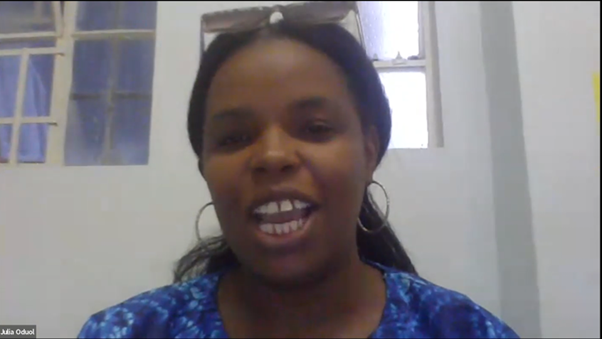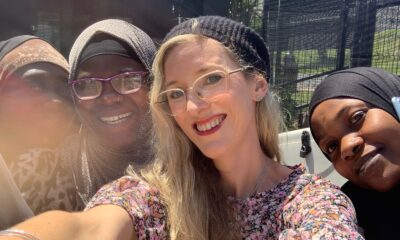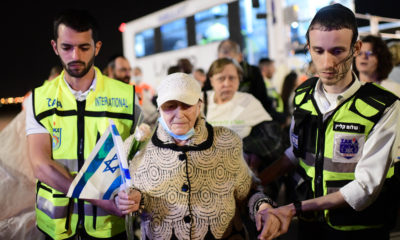
Featured Item

Helping ‘people on the move’ regain their dignity
Julia Oduol hails from Nakuru, Kenya. She has been an asylum seeker in Cape Town since 2008. Her husband, a politician, was forced to flee from Kenya due to post-election violence in which 1 200 people were killed. Eventually, he made his way to Cape Town and she joined him with her very young son. “I never thought I’d leave my home,” Oduol said. “No one chooses to be a refugee. I had to search for safety.”
Oduol was speaking at a webinar hosted by Mensch on 27 February, which delved into the experiences of refugees and the people that assist them. With more than 120 social entrepreneurs as members, Mensch is the largest organisation of Jewish change makers in South Africa.
In designating February “Refugee Awareness Month”, Mensch drew inspiration from HIAS (formerly the Hebrew Immigrant Aid Society), an American organisation that originally assisted Jewish immigrants to the United States (US) more than 100 years ago, but now focuses on all communities. HIAS hosts an annual Refugee Shabbat. “It’s based on the Jewish injunction of helping the stranger,” Mensch Executive Director Gina Flash said. “HIAS is a huge inspiration to Jewish organisations in South Africa, to see the work being done through a Jewish lens.”
“Everything was a struggle, from documents to finding schooling, a home, a job,” said Oduol of her time in Cape Town. “And in 2008, there were xenophobic attacks in South Africa.”
She went on to enrol in higher education, studying through the Global Education Movement, and today, is part of Oxford University’s Refugee-Led Research Hub. She described her experience as a fight to get her humanity and self-esteem back. “As a woman, a refugee undergoes double discrimination. I hope to inspire others. We must look beyond the labels, and see the beauty of every human being.”
Shingi West, originally from Zimbabwe, runs the Women’s Platform at the Scalabrini Centre of Cape Town, an organisation that offers paralegal advice, engages in advocacy, training, and development and helps integrate “people on the move”. The Women’s Platform helps women to deal with trauma in a safe space and adjust to their new home. It empowers them with information about their rights, and assists them to find jobs.
Leah Mundell, a social anthropologist at North Arizona University, used to work at the Scalabrini Centre. She spoke about conditions on the US-Mexico border, and how the control of national borders has increasingly become militarised in both the US and South Africa.
“Borders seek to keep some people in and others out. They are immoral and futile, especially in a world affected by climate change where we are all impacted,” Mundell said. She clarified definitions of various words applied to “people on the move” such as “refugee”, “asylum seeker”, and “undocumented migrant”. She thanked HIAS and other organisations for alerting the public to changes in US immigration policy that makes applying for asylum much harder, including through a poorly functioning app that must be used before people enter the US.
Mensch board member and psychotherapist Romi Kaplan spoke about how she had been able to help Ukrainians in the current crisis from afar. She was involved in an Israeli initiative called EmotionAid, a network of therapists that provided services to Ukrainians to deal with the trauma of forced migration. They worked in Poland, the Czech Republic, and Germany, among others.
She said the five to six million refugees from Ukraine had been welcomed by the European Union in ways that are unusual with large flows of people, ensuring they could find work and had access to healthcare and education. Many have been housed in private homes. “Europe has been shocked by this war,” Kaplan said.
Finally, Amanda Solomon spoke about the H18 Foundation, an organisation that she founded in Cape Town that helps women create and sell crafts to support their families, including crocheting with plastic bags. She has worked with about 120 women since 2016, most of them economic migrants from Malawi and Zimbabwe.
Many had young children with them, having left their older children back home. In 2021, H18 moved to the premises of a pre-school that had closed, where Solomon opened the Mana Pre-School (from the Maori word for “spiritual enlightenment”). The children of the mothers at H18 and others in the area receive an excellent pre-school education, improve their English, and have three meals a day.
This work is much needed in a society like South Africa where unfortunately, xenophobia thrives. With Jews having been “people on the move” so many times in our history, the efforts in this sector by Mensch members and others is something we can all be proud of.










